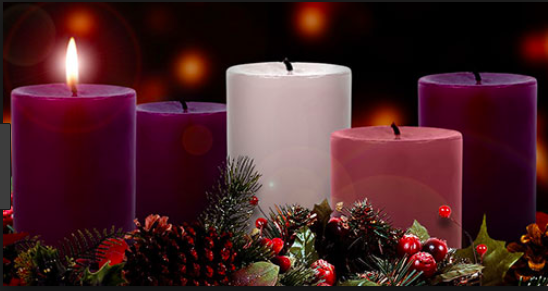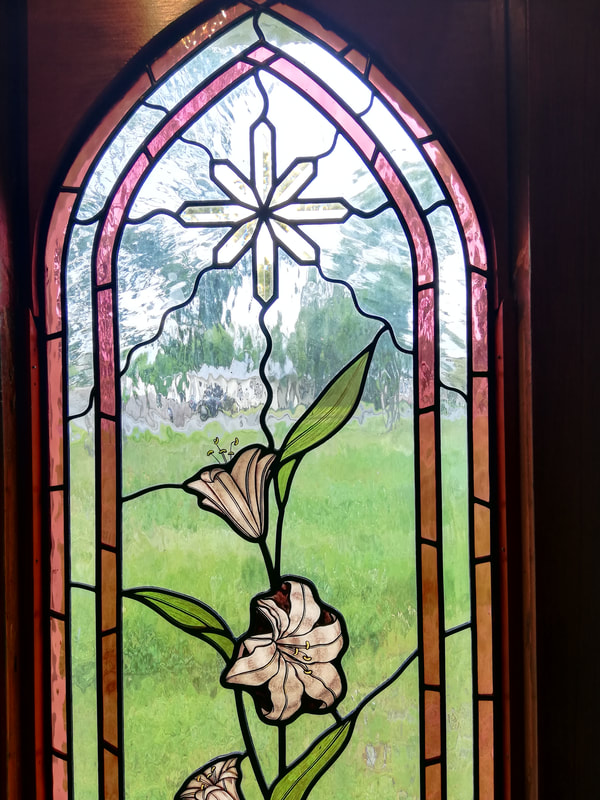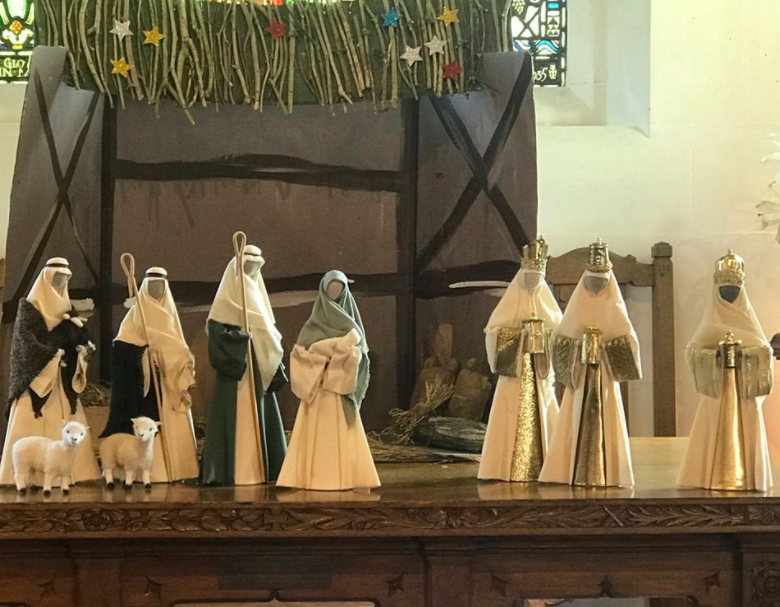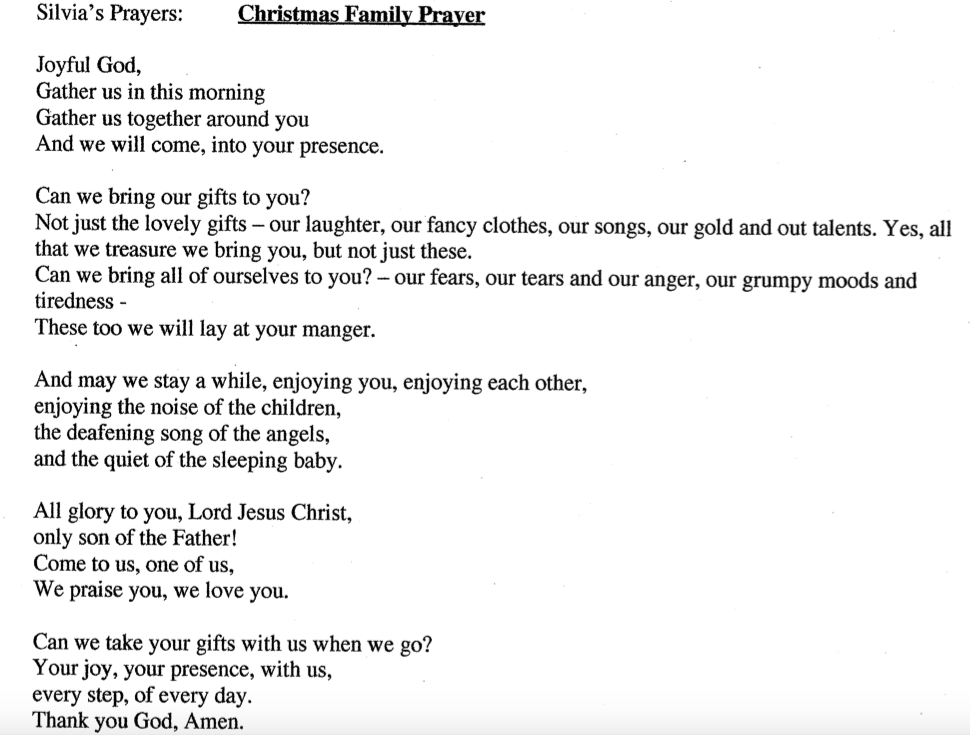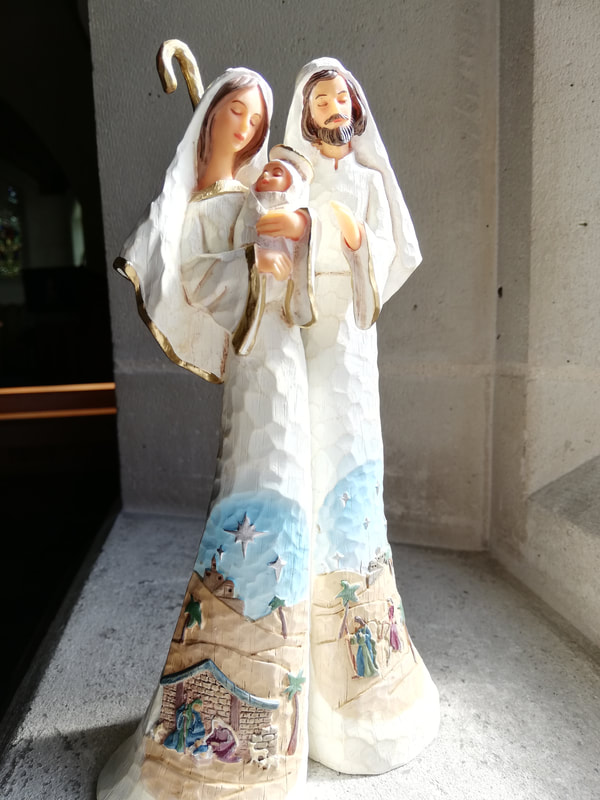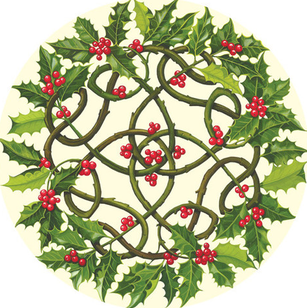Christmas
Christmas messages in the 'Christmas' section under 'Word'
Christmas Poems: a collection of some extra special poetry and song lyrics
Christmas Poems: a collection of some extra special poetry and song lyrics
|
Advent Candle lighting: Joy
Come, light of the world, come live in our hearts, come move in-between us, come shine in the darkness. This candle shines for joy, for joy is needed now in our world. Joy is a hunger and hope is a gift, a gift of the Christ child, born in the night Come, light of the world be our joy, we pray. |
Download three entire sets of Advent Candle lighting prayers HERE
|
|
A Christmas Psalm: based on Psalm 96
Sing a new song to the Lord All the earth, sing! All you people, sing! See God’s glory, it is coming! Tell of God’s salvation, it is coming into the world! Speak of greatness, strength to overcome. Come out to meet the Lord, proclaiming his name. Come into his holy place and tremble. All the earth, tremble in wonder. All the galaxies, rejoice in praise! All the oceans and all that lives in the sea – sing for joy! All the fields and forests and all that lives on the land – shout for joy! For the Lord is coming - he is coming to make everything new, he is coming to put things right. Rejoice for the Lord is coming … But will we see him, born in a manger? Will we proclaim him, son of Mary? Will we welcome him, this stranger in a strange land? Will we honour him, this unexpected judge of the world? Lord God, we see you, born in a manger. Lord Jesus, we proclaim you, son of God and son of man. Loving God, we welcome you; come make your home among us. Lord Jesus, we honour you and praise you and choose again to follow. Sing a new song to the Lord! Amen. |
|
Advent Blessing Be alert, be awake, be ready, for the Lord is coming! Be watchful, take note; open your eyes for the Lord is here! Listen carefully for his voice in the crowd and in the stillness. Be on the lookout for his hand at work, for God is at work. Look and you will see his love in action. Be ready to notice God’s grace making space for hope, and his peace shimmering on the water. |
"Small and Simple"
Some people just love Christmas, all the fluff and kerfuffel of it. It’s great if you have gift-giving as one of your love languages. Some people love to put a lot of thought and preparation into choosing just the right gift for the right person, beautifully wrapped and presented. I’m just not sure that’s me. I do like making things each Christmas. I tend to pick a project and everyone gets the same, whether it’s my special spice mix or a homemade candle. It doesn’t quite feel like Christmas until I have done made some things to give away. I do love Christmas. I love each of my Christmas decorations, and I love hanging them carefully on the tree. I love picking a colour theme for the table. But what I love mostly are the smallest things, a tiny nativity carved out of wood that my friend brought me back from Madagascar, a coil of lights in a glass jar. My gift to you is a small and simple booklet of Christmas readings and carols. It invites you to draw aside with God for a few minutes every day, to read a short Bible verse, to find simple things that draw your attention to Christ. The parties and the preparation are wonderful and I hope you thoroughly enjoy it all this year. But treat yourself to some space with God this Christmas. Appreciate the small and simple things. |
CLICK HERE for a simple photocopied booklet of Christmas readings, including a daily reading guide (with help from Catholic.com). It is not my own work; it includes a couple of lovely poems from Madeline L'Engle's fabulous 'Winter Song' book, as well as a couple of our very special Kiwi authors, Shirley Murray and Joy Cowley (also copied below).
Christmas prayers
|
Christmas Prayers: a pdf resource including blessings, a Christmas version of the Lords Prayer, and dedication for offerings. Also a collection of Christmas Irish blessings
Light and peace to you from Jesus Christ Thanks be to God This is the first Sunday in Advent, and we light the candle of hope. We claim a hope we do not feel. We choose to trust despite our fear. The flame is small and the winds are strong. But Christ will come, the promise stands from dawn of time, that Christ will come a baby born, a world undone, remade by hope and peace and love. Come, Lord Jesus, Lord of hope. You are welcome here. Reading: Isaiah 9:2-7
Prayers for others The people who walked in darkness have seen a great light. Dear God, we pray for all people who feel lost in the dark in this life. Be near to those who feel sad, heal those who are sick. Give light to those who cry out to you, Lord Jesus, we pray. You have given your people great joy; they rejoice in what you have done. Dear God, we pray for families everywhere this Christmas time, that there will be real joy in every home No matter how much money or food or how many presents, may there be joy in belonging in family May every child feel that they are loved this Christmas, and every old person feel that they are loved. For a child is born to us! A son is given. Dear God, we pray for little babies, and for those not yet born Bring them safe into this world Make us a society where every child is cared for. He will be called, “Wonderful Counselor,” “Mighty God,” “Eternal Father,” “Prince of Peace.” Dear God, we pray for peace for our world, peace in our time May people everywhere find true peace from knowing you, Mighty God and Eternal Father. His authority shall grow continually and there shall be endless peace This we pray, in the name of our Lord Jesus Christ, the Prince of Peace. Amen. We light the candle … for Christmas Eve night
We light the candle of Hope In hope we are born, and sustained by hope this light shines despite everything. A candle seems such a fragile thing, a flickering in the dark. May hope splutter into life in us again and again. God of new beginnings and new possibilities, be born in us this night, we pray. Amen. We light the candle of Peace When fear prowls the night and anxieties crowd the day peace is a half-remembered gentleness, of kinder times. We light this candle for peace, peace in our minds, peace in our homes, peace in our world. God of grace, make us safe in ourselves that we might be safe space for others. Be born in us this night, we pray. Amen. We light the candle of Joy Ah, joy! Come with lightness, come with laughter! Tickle us until we forget how important we are. Pounce on us, surprise us, lift us out of worry and gloom. Generous God, give us joy this Christmas, joy for the giving away; be born in us this night, we pray. Amen We light the candle of Love Love comes, as love always comes, where a heart opens to another where I see you and a connection sparks in the space between us. Love is our daily bread and our festive cake Love is who you are, Father of Jesus Be born in us, more space for love. We light the Christ candle In the beginning was the Word, and the Word was with God and the Word was God. In him was life, and that life was the light of all mankind. The light shines in the darkness, and the darkness has not overcome it. Come, light of the world. Come, live in our hearts, Come, live in between us. Jesus Christ, be born in us, we pray, this night. Be our light. Amen. |
Blessing (from John 1)
May the blessing of God shine in you, the life of God that is the light of the world. May the grace and truth of Jesus Christ grow in you. May the Spirit of God be at home in your heart, for God became flesh and came to be with us. May the glory of God surround you and uplift you, this Christmas time and for all eternity. Amen. Blessing
Come let us adore him, Christ the Lord! May you go with adoration ringing in your heart. Enjoy the gifts and blessings of Christmas as you celebrate the birth of Jesus, whatever this day brings. Go in peace. Amen. Nativity
by JOY COWLEY Look now! It is happening again! Love like a high spring tide is swelling to fullness and overflowing the banks of our small concerns. And here again is the star, that white flame of truth blazing the way for us through a desert of tired ways. Once more comes the music, angel song that lifts our hearts and tunes our ears to the harmony of the universe, making us wonder how we ever could have forgotten. And now the magi within us gathers up gifts of gold and myrrh, while that other part of ourselves, the impulsive,reckless shepherd, runs helter skelter with arms outstretched to embrace the wonder of it all. We have no words to contain our praise. We ache with awe, we tremble with miracle, as once again, in the small rough stable of our lives, Christ is born. O Emmanuel
by Malcolm Guite O come, O come, and be our God-with-us O long-sought With-ness for a world without, O secret seed, O hidden spring of light. Come to us Wisdom, come unspoken Name, Come Root, and Key, and King, and holy Flame. O quickened little wick so tightly curled, Be folded with us into time and place, Unfold for us the mystery of grace And make a womb of all this wounded world. O heart of heaven beating in the earth, O tiny hope within our hopelessness Come to be born, to bear us to our birth, To touch a dying world with new-made hands And make these rags of time our swaddling bands. New Heaven, New War (full poem)
by Robert Southwell (last 3 verses set to music by Benjamin Britten) This little babe, so few days old, Is come to rifle Satan’s fold; All hell doth at his presence quake. Though he himself for cold do shake, For in this weak unarmèd wise The gates of hell he will surprise. |
Christmas Prayers of Intercession
We praise you, Lord, for you have come to us, you have comforted us
Surely you O God are our salvation. We will trust in you and not be afraid.
Surely you O God are our strength and our guard
With joy we draw water from the wells of salvation
and proclaim to the world the greatness of your name.
Let everyone in Zion shout and sing!
for our holy God is great, and he lives among his people.” (Isaiah 12:1-6)
We bring you our thanks this Christmas time
Thank you for every gift, may we treasure all that you give us, in so many ways
We pause in this moment of silence to express to God our gratitude.
…
As well as our joys, we bring you our sorrows this Christmas time
You know us through and through, your know our hearts and all that grieves us and all that rises to trouble us. You know what we have lost and we fear.
We pause in this moment of silence to give to God our troubles.
…
At any time, but especially at Christmas time, we bring you our love
Grow our love and our compassion.
Through the frustration of human relationships flow your grace and your forgiveness. Share with us your heart, we pray, that we might love as you love
We pause in this moment of silence to pray for those we love.
We pray also for those in need, in pain, homeless or in prison this Christmas time.
We gather all our prayers in the words that Jesus taught us: The Lord’s Prayer
We praise you, Lord, for you have come to us, you have comforted us
Surely you O God are our salvation. We will trust in you and not be afraid.
Surely you O God are our strength and our guard
With joy we draw water from the wells of salvation
and proclaim to the world the greatness of your name.
Let everyone in Zion shout and sing!
for our holy God is great, and he lives among his people.” (Isaiah 12:1-6)
We bring you our thanks this Christmas time
Thank you for every gift, may we treasure all that you give us, in so many ways
We pause in this moment of silence to express to God our gratitude.
…
As well as our joys, we bring you our sorrows this Christmas time
You know us through and through, your know our hearts and all that grieves us and all that rises to trouble us. You know what we have lost and we fear.
We pause in this moment of silence to give to God our troubles.
…
At any time, but especially at Christmas time, we bring you our love
Grow our love and our compassion.
Through the frustration of human relationships flow your grace and your forgiveness. Share with us your heart, we pray, that we might love as you love
We pause in this moment of silence to pray for those we love.
We pray also for those in need, in pain, homeless or in prison this Christmas time.
We gather all our prayers in the words that Jesus taught us: The Lord’s Prayer
Nativity Play"The Angels' Big Entrance" is a brand new nativity play - which means that it has all your favourite Christmas characters, includes various carols, and ends with the "ohhh" moment as the nativity scene is formed at the front. It has 5 speaking parts, plus you can involve as many children or whatever ages as show up on the day without needing rehearing. This play is from the perspective of the angels: there's Gabriel keen for his big moment, and 2 assistant angels running around trying to find out where the Messiah will be born.
Download the script of the play HERE Download the powerpoint to go with it HERE |
Christmas & Advent Psalms
Looking for a Call to Worship during December? ... look no further!
The Lectionary Psalms this year are 80, 85, 126, 89, 97 & 98. These (plus a little extra) are paraphrased and formatted here for use in worship.
Click HERE for the page in this website.
Click HERE to download the pdf.
The Lectionary Psalms this year are 80, 85, 126, 89, 97 & 98. These (plus a little extra) are paraphrased and formatted here for use in worship.
Click HERE for the page in this website.
Click HERE to download the pdf.
Make room
In this busiest of seasons, it is up to each of us to make space for Christ.
There is plenty that will crowd out God, even as God is coming to us.
Time: What’s a good time in your day when you can sit and be still for a moment?
Place: What’s a comfy seat, in bed, by the window, in the garden? Prepare a space, make a cup of tea, get your Bible, pen and paper ready. Sit and rest with God a while.
We all need some solitude, but you can also sit with a child or a friend and read and pray together.
A Welcome Place for Jesus
Find a spot in your home to lay out a ‘welcome place for Jesus’. Lay down a pretty cloth. Set out your nativity set. Add Christmas cards as they come. Each day, find a small simple thing to place there. Maybe a single flower, or a stone, or a treasured gift from the past. Maybe light a candle.
Noticing the little things
Take your camera out for a walk in the park. Look for small beautiful things, take close-up photos.
Slow down and notice.
In this busiest of seasons, it is up to each of us to make space for Christ.
There is plenty that will crowd out God, even as God is coming to us.
Time: What’s a good time in your day when you can sit and be still for a moment?
Place: What’s a comfy seat, in bed, by the window, in the garden? Prepare a space, make a cup of tea, get your Bible, pen and paper ready. Sit and rest with God a while.
We all need some solitude, but you can also sit with a child or a friend and read and pray together.
A Welcome Place for Jesus
Find a spot in your home to lay out a ‘welcome place for Jesus’. Lay down a pretty cloth. Set out your nativity set. Add Christmas cards as they come. Each day, find a small simple thing to place there. Maybe a single flower, or a stone, or a treasured gift from the past. Maybe light a candle.
Noticing the little things
Take your camera out for a walk in the park. Look for small beautiful things, take close-up photos.
Slow down and notice.
Christmas Poems
These poems come with the suggestion that you find more poems and Carols to enjoy. You probably have some old books in your home, and there are plenty at the library and online.
You may even feel inspired to write your own!
Sources
Madeleine L’Engle & Luci Shaw, ‘WinterSong: Christmas Readings’ (Regent College, 1996)
The New Zealand Hymnbook Trust, ‘Carol our Christmas: A book of New Zealand carols’ (1996)
You may even feel inspired to write your own!
Sources
Madeleine L’Engle & Luci Shaw, ‘WinterSong: Christmas Readings’ (Regent College, 1996)
The New Zealand Hymnbook Trust, ‘Carol our Christmas: A book of New Zealand carols’ (1996)
|
Into the Darkest Hour
by Madeleine L’Engle It was a time like this, War & tumult of war, a horror in the air. Hungry yawned the abyss – and yet there came the star and the child most wonderfully there. It was a time like this of fear & lust for power, license & greed and blight – and yet the Prince of bliss came into the darkest hour in quiet & silent light. And in a time like this how celebrate his birth when all things fall apart? Ah! wonderful it is with no room on the earth the stable is our heart. First Coming by Madeleine L’Engle He did not wait till the world was ready till men and nations were at peace. He came when the the Heavens were unsteady, and prisoners cried out for release. He did not wait for the perfect time. He came when the need was deep and great. He dined with sinners in all their grime, turned water into wine. He did not wait till hearts were pure. In joy he came to a tarnished world of sin and doubt. To a world like ours, of anguished shame he came, and his Light would not go out. He came to a world which did not mesh, to heal its tangles, shield its scorn. In the mystery of the Word made Flesh the Maker of the stars was born. We cannot wait till the world is sane to raise our songs with joyful voice, for to share our grief, to touch our pain, He came with Love: Rejoice! Rejoice! All over creation by Shirley Murray All over creation, joy spills into light, stars, candles ablaze this Christmas night; where Jesus is sleeping, peace kisses the earth, O that we could know who Mary has brought to birth! This child will bring freedom, this child will release wellsprings of compassion, ways to peace, this child will bring healing, this child will inspire love answering love, and spirit to Spirit's fire. This child will befriend us, this child will invite all children to share his world's delight: this Christ will confront us when, children no more, we plunder our planet, crying from want and war. Let there be a moment held, as in one breath when all the earth turns away from death, peace nursing creation, peace spreading her wing, O that we could know what Christmas is meant to bring! |
Virgin Birth
by Joy Cowley We have within us a virgin place, a holy space which belongs to God alone. We know it by its hunger, we name it by its need, the space which will not be touched by the people we love or the things we gather or the positions we hold. We have within us a growing place, an eternal space that exists for Truth, where the love of God overcomes us, where the life of God fills us, the Emmanuel space where we conceive and become pregnant of the Holy One and day by day, give birth to Christ in the world. All who would see God’s greatness by Marnie Barrell All who would see God's greatness, draw near, bend down, look low: see how love appears among us as small as a child. Then go, tell of the greatness made so small, tiny and hidden, God of all. If you would share God's riches, draw near, reach out and touch: God has only love to offer, enough for us, and too much. Take up God's treasure, made so poor, naked the God that we adore. Would you receive God's power? Draw near, find strength in this: laid open to all our violence is love that will not resist. This is our God, who chose to be tied with our bonds to set us free. Stand in the holy silence while earth with heaven sings that here in our hands for holding is love that sustains all things. Strange is this love that draws us near: Glory of God, among us here. A Christmas Carol Poem by G. K. Chesterton The Christ-child lay on Mary's lap, His hair was like a light. (O weary, weary were the world, But here is all aright.) The Christ-child lay on Mary's breast His hair was like a star. (O stern and cunning are the kings, But here the true hearts are.) The Christ-child lay on Mary's heart, His hair was like a fire. (O weary, weary is the world, But here the world's desire.) The Christ-child stood on Mary's knee, His hair was like a crown, And all the flowers looked up at Him, And all the stars looked down |
A Celtic Christmas
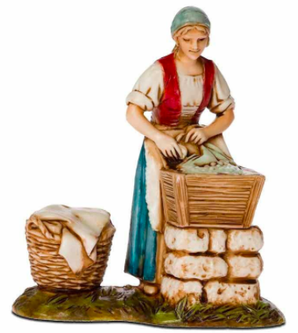
I found this lovely article: A Celtic Christmas
Written by Mary Earle, www.explorefaith.org
Historically, at this time of the year, the peoples of the Celtic lands (Scotland, Ireland, Wales, Brittany, Cornwall, Isle of Man, Galicia) marked the natural rhythm as autumn turned to winter. This was a time for watching for the light’s return, even in the midst of darkness. This was a time for pondering endings and beginnings. As Christianity came to these lands, perhaps as early as the first century, there was a ready embracing of the proclamation that Jesus was the Son of God.
The Celtic peoples celebrated the natural world as shot through with divine presence. For them, the divine becoming human was plausible, welcome and true. Incarnation was not a stumbling block as it was to the Greeks. This faith that had a central story of a man who came from God and returned to God, a man who was God’s Son, did not seem so far-fetched to the Celtic mind.
In every Welsh nativity scene, a washerwoman accompanies Mary, Joseph and Jesus at the manger. For the Welsh tradition, if Jesus isn’t born daily into the common household, then there’s really no point of celebrating the birth at Bethlehem. Jesus’ birth, singular as it is, also shows us the sacredness of each child, knit together in the mother’s womb by God’s own Spirit. Jesus’ birth reminds us that each household is dear to God.
We celebrate the deep compatibility of the divine and the human as we rejoice in the Incarnation—in God’s life being revealed to us in the baby boy born at Bethlehem, God being birthed into human life, taking on human nature from the inside out.
As an old Welsh poem states
Mary nurtures a Son in her womb:
His birth a blessing to those who discover him.
He goes forth like the sun,
great is the number of his company.
Written by Mary Earle, www.explorefaith.org
Historically, at this time of the year, the peoples of the Celtic lands (Scotland, Ireland, Wales, Brittany, Cornwall, Isle of Man, Galicia) marked the natural rhythm as autumn turned to winter. This was a time for watching for the light’s return, even in the midst of darkness. This was a time for pondering endings and beginnings. As Christianity came to these lands, perhaps as early as the first century, there was a ready embracing of the proclamation that Jesus was the Son of God.
The Celtic peoples celebrated the natural world as shot through with divine presence. For them, the divine becoming human was plausible, welcome and true. Incarnation was not a stumbling block as it was to the Greeks. This faith that had a central story of a man who came from God and returned to God, a man who was God’s Son, did not seem so far-fetched to the Celtic mind.
In every Welsh nativity scene, a washerwoman accompanies Mary, Joseph and Jesus at the manger. For the Welsh tradition, if Jesus isn’t born daily into the common household, then there’s really no point of celebrating the birth at Bethlehem. Jesus’ birth, singular as it is, also shows us the sacredness of each child, knit together in the mother’s womb by God’s own Spirit. Jesus’ birth reminds us that each household is dear to God.
We celebrate the deep compatibility of the divine and the human as we rejoice in the Incarnation—in God’s life being revealed to us in the baby boy born at Bethlehem, God being birthed into human life, taking on human nature from the inside out.
As an old Welsh poem states
Mary nurtures a Son in her womb:
His birth a blessing to those who discover him.
He goes forth like the sun,
great is the number of his company.
|
Celtic Christmas Blessings
In the light of the Christmas star – God bless you. In your travels, both near and far – God bless you. As you celebrate Jesus’ birth – God bless you. As you pray for peace on earth – God bless you. The light of the Christmas star to you the warmth of home and hearth to you the cheer and good will of friends to you the love of the Son and God’s peace to you By the brilliance of the Christmas candle may God fill your home with light and warmth and guide your footsteps through the New Year in ways of joy and peace! A Celtic Christmas Blessing God send us a happy Christmas! His blessing be on our home. His love be around our loved ones wherever they may roam. God send us a holy Christmas! His name be on every mind and close to the crib of Bethlehem true happiness may we find. God send us a peaceful Christmas! May the sweetness of memories throng where we sit at the festive table and sing a soothing song. God send us a merry Christmas to us and all we love! On our home may the babe of Bethlehem smile down from his home above. Nollag Shona Nollaig Chridheil |
Grandma’s Story
A Christmas Drama
A dramatic telling of the Christmas night, from Grandma's perspective. Only one reader required.
Well, I have some news. We have a new baby in the family! Ah, and you didn’t even know that any of my lot were with child did you? Who is it? Oh, my brother James’ boy – God rest his soul. He moved to Nazareth, remember? His boy, Joseph. Yes, well they only arrived yesterday, he and his young lady
Well, I wasn’t exactly going to bend over backwards to find a nice room for them, not after the rumours I’d been hearing. Now, you know I’d be the LAST person to gossip, but ...
A Christmas Drama
A dramatic telling of the Christmas night, from Grandma's perspective. Only one reader required.
Well, I have some news. We have a new baby in the family! Ah, and you didn’t even know that any of my lot were with child did you? Who is it? Oh, my brother James’ boy – God rest his soul. He moved to Nazareth, remember? His boy, Joseph. Yes, well they only arrived yesterday, he and his young lady
Well, I wasn’t exactly going to bend over backwards to find a nice room for them, not after the rumours I’d been hearing. Now, you know I’d be the LAST person to gossip, but ...
Growing faith at home this Christmas
A letter to families, with suggestions for how to deepen faith through the Christmas season.
A letter to families, with suggestions for how to deepen faith through the Christmas season.
